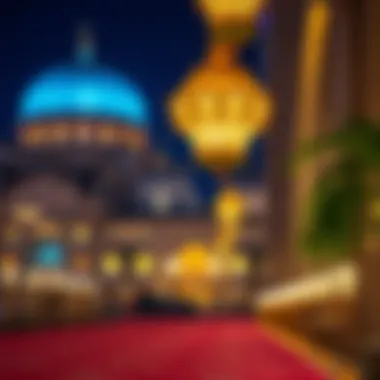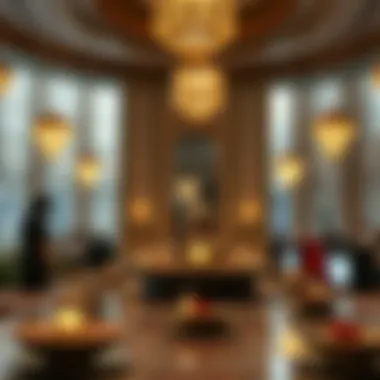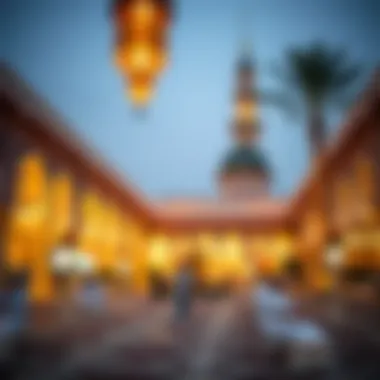Ramadan 2024 in Dubai: Dates and Cultural Insights


Intro
As the holy month of Ramadan approaches in 2024, Dubai becomes a tapestry of deep-rooted traditions and vibrant customs, intertwined with a modern way of life. The significance of Ramadan stretches beyond fasting; it encompasses spiritual reflection, community bonding, and cultural richness. For residents, expatriates, and investors, recognizing how Ramadan impacts daily life and the property market in Dubai is crucial. This article serves as an indispensable guide, offering key dates, daily practices, and insights into how Ramadan shapes the local real estate landscape.
Market Trends and Analysis
Current Market Conditions
The real estate sector in Dubai has shown resilience, even during challenging times, thanks to a robust economy and a steady influx of expatriates. During Ramadan, property demand tends to pivot slightly. Many families look to relocate, seeking larger spaces or homes that are closer to facilities that cater to prayer and community gatherings. The months preceding Ramadan often see a slight uptick in home searches, particularly in neighborhoods known for their family-friendly amenities and ease of access to mosques.
Furthermore, it's important to note that rental rates can experience fluctuations during this time. Many landlords are willing to negotiate rents, making Ramadan a potential opportunity for prospective tenants.
Future Predictions and Growth Areas
Looking ahead, several indicators suggest that the real estate market will continue to flourish through and beyond Ramadan 2024. Key areas showing promise include Dubai Creek Harbour and Dubai Hills Estate. These districts not only offer a blend of tranquility and community life but are also strategically located near essential amenities and prayer facilities.
Investors should consider focusing on properties that provide ease of access to mosques, shopping centers, and family-friendly environments as these are likely to witness sustained demand.
"During Ramadan, properties that can cater to communal feelings and family gatherings are in heightened demand."
Property Investment Strategies
Types of Properties to Consider
When it comes to property investment during Ramadan, consider residential developments with features that foster community engagement. Townhouses and villas in vibrant neighborhoods might be ideal. These types of properties encourage both privacy and a sense of belonging, providing space for family meals to break the fast and gatherings for prayer.
In particular, high-rise apartments near popular retail areas could also be lucrative, as they offer convenience for shopping and dining, not to mention a range of options for iftar meals.
Financing Options and Considerations
For expatriates and investors looking to capitalize on the opportunities presented during Ramadan, understanding financing options is key. Mortgage rates tend to remain stable, but potential buyers should also be aware of varying lender criteria, especially in terms of eligibility for expatriate buyers.
Utilizing services from financial advisors familiar with the Dubai real estate landscape can ease the process, helping investors secure funding for their chosen property. Additionally, timeframe considerations during Ramadan can lead to delays; it’s wise to factor in holiday timing when making investment decisions.
As you gear up for Ramadan 2024, keeping track of these market trends and property investment strategies will not only enhance your awareness but also empower you to navigate this vibrant real estate arena effectively.
For further insights on the Dubai real estate market, check out these resources:
Dubai Land Department
Property Finder
ExpatWoman
In this bustling metropolis, Ramadan serves as a reminder of community, resilience, and the spirit of togetherness. It beckons for mindful engagement with local customs and an astute understanding of real estate dynamics.
Understanding Ramadan
Ramadan holds significant importance, not just for Muslims around the world, but also serves as a focal point for cultural exchange and understanding in a global city like Dubai. This holy month is much more than just a religious observance; it involves communal gathering, charity, and a deep reflection on one's faith and lifestyle.
For those residing in or visiting Dubai—an epicenter of diversity—understanding the nuances of Ramadan can facilitate smoother interactions and better relationships with both locals and expatriates alike. Knowing the specific dates, practices, and cultural sensitivities during this period can enhance daily life and help avoid potential misunderstandings.
Benefits of Understanding Ramadan:


- Cultural Awareness: A deeper appreciation of local customs can lead to more meaningful interactions in both social and business environments.
- Timing and Schedules: Awareness of prayer times and fasting hours can help individuals plan their days effectively while being respectful of those observing the fast.
- Community Engagement: Participation in local events and traditions fosters a sense of community—whether one is a resident or a visitor. This engagement can open doors for networking and building valuable relationships, particularly for professionals in fields like real estate and investment.
Historical Significance of Ramadan
Historically, Ramadan is believed to be the month when the Quran was revealed to the Prophet Muhammad. This event is acknowledged by Muslims as a miraculous moment that transformed the course of human history. Fasting during this month is one of the Five Pillars of Islam, emphasizing self-discipline, compassion for the less fortunate, and spiritual reflection.
Celebrating Ramadan in Dubai allows one to engage with a rich tapestry of traditions. From the serene nights of Tarawih prayers to the spiritual ambiance that fills the city, Ramadan stretches back centuries with practices that have evolved yet remain anchored in ancient heritage. The historical significance of this month reminds us of the fundamental principles of unity and peace that Islam promotes.
Cultural Practices During Ramadan
Cultural practices during Ramadan in Dubai provide a multifaceted view of how this month is celebrated. From the early morning meal known as Suhoor to the breaking of fast at sunset with Iftar, every moment is filled with enthusiasm and community spirit. The sound of the adhan—the call to prayer—echoes through the streets, marking both the beginning and end of fasting hours.
In Dubai, vibrant Iftar gatherings, where families and friends come together to share a meal, highlight the communal aspect of Ramadan. Restaurants often prepare lavish buffets, showcasing a blend of traditional Emirati dishes alongside international cuisine. Special events and celebrations, from cultural exhibitions to community service projects, allow residents to engage more fully, deepening connections with others.
Furthermore, charitable giving, or Zakat, is especially emphasized during Ramadan, as many choose to donate to local organizations. This collective spirit of giving not only uplifts the community but also casts light on Dubai's strong values of generosity and compassion.
Ramadan teaches the lessons of patience, perseverance, and empathy, reminding everyone to reflect, repent, and rejoice.
In essence, the cultural practices during Ramadan in Dubai are rich, layered, and marked by an infectious sense of community and spirituality that resonates deeply with both locals and visitors.
Ramadan Dates in Dubai
Understanding the dates of Ramadan in Dubai is crucial for both residents and expatriates as it influences various aspects of life in the city. This month is not only a time for spiritual reflection and community bonding but also impacts daily activities, business operations, and even the real estate landscape. Knowing when Ramadan starts and ends helps individuals prepare for their adjustments during this holy month, ensuring respectful and engaged participation in cultural practices. This section dives into the key dates of Ramadan 2024, helping you navigate this significant period with ease.
Expected Start Date
Ramadan is anticipated to begin on the evening of March 10, 2024, with the first full day of fasting on March 11, 2024. These dates, however, are subject to the sighting of the moon, a tradition deeply rooted in Islamic practices. The moon sighting can sometimes lead to slight variations, resulting in communities needing to stay connected for the latest information. Understanding when Ramadan commences is essential for those who plan to participate in fasting, evening prayers, and social gatherings.
Because the start of Ramadan can shift by a day, many local mosques and community centers will announce the start officially, so keeping an ear to the ground will help avoid any miscommunication. Furthermore, the atmosphere begins to shift weeks prior—with stores stocking up on dates and Ramadan-themed decor, indicating the city's collective excitement in anticipation of the month ahead.
Anticipated End Date
Ramadan is expected to conclude on April 9, 2024, with Eid al-Fitr celebrations likely starting the following day on April 10, 2024. Just as the start of Ramadan is determined by moon sightings, the end date follows suit. This duality underscores the importance of flexibility in observance, with families often gathering for the joyous Eid celebrations marked by meals and giving back to the community. The end of Ramadan brings with it a sense of accomplishment for those who have fasted and engaged in charitable acts.
This period is not just a phase of fasting but a time of communal reflection and renewed relationships, which resonates deeply with the culture in Dubai. As you approach these dates, consider how you will fit into the community observance while also acknowledging the nuances of business operations and social etiquette that accompany this sacred month.
"Observance of Ramadan is more than just abstaining from food; it's about spiritually nourishing the soul and strengthening community bonds."
In summary, preparing for the start and end of Ramadan gives residents and expatriates alike a solid footing to navigate the month with respect and dedication. This knowledge is vital not merely from a logistical standpoint but for fostering an understanding of the spiritual significance underlying these dates.
Timing Considerations
Understanding the timings during Ramadan is crucial for anyone residing in Dubai, including expatriates and long-term residents. Timing considerations are not merely about schedules; they resonate deeply with cultural significance and community engagement. The precise timings for both Suhoor (the pre-dawn meal) and Iftar (the meal to break the fast) can vary daily due to the lengthening of days through the month. To accommodate this variation, knowing the schedule is vital for daily routines, religious practices, and social gatherings.
There’s a rhythm to Ramadan that emerges from these timings. Not only do they mark the beginning and end of each day’s fast, but they also dictate how one plans meals, manages work hours, and interacts with family and friends. Getting these timings right can transform the experience, allowing individuals to participate wholeheartedly in the month's spiritual essence.
Suhoor and Iftar Timings
The timing of Suhoor and Iftar is commonly communicated through various means, including local mosques, community announcements, and dedicated apps. In Dubai, Suhoor typically takes place before the Fajr prayers—around 4:30 AM to 5:00 AM, depending on the exact date and geographical location. As the month progresses, this time shifts slightly, which can catch folks off guard if they don't stay updated.


To break the fast, Iftar is traditionally held at sunset, approximately at 6:40 PM, adjusting as daylight hours change. During this time, families and friends gather to share a meal, emphasizing the importance of community. In many homes, the evening starts with dates and water, following which a feast usually unfolds—often featuring hearty dishes and sweet treats.
Many restaurants across Dubai also participate by offering special Iftar menus, catering to diverse tastes, from traditional Emirati dishes to international cuisine. It becomes a peak time of social activity, vibrant with celebration and communal spirit, making these meal times not only physical sustenance but deeply integral to the social fabric of Ramadan.
Adjustments for Prayer Times
Prayer times during Ramadan also undergo adjustments. In Dubai, Fajr, Dhuhr, Asr, Maghrib, and Isha prayers are affected by the shifting time of year. As such, it’s important for residents to familiarize themselves with the Islamic calendar and local prayer schedules.
The adjustments not only aid in the spiritual observances but also inform daily routines, as many workplaces and schools may shift their timings to better suit the requirements of fasting individuals. Businesses often exhibit flexibility during Ramadan by reducing hours, allowing employees to attend prayers and partake in family meals.
Overall, mastering the timing considerations during Ramadan is essential. It enables individuals to navigate their daily lives with grace, ensuring they embrace the essence of the month fully. By being aware of Suhoor, Iftar, and prayer times, residents and visitors alike can create meaningful experiences while respecting this sacred period.
Observances in Dubai
The observances during Ramadan in Dubai are not merely rituals; they form an integral part of both social and cultural fabrics within the city. These practices reflect a unique blend of tradition and modernity, making them essential not just for Muslims but also for residents and expatriates who wish to engage respectfully with the community. Understanding these observances helps to create a harmonious living environment, fostering respect and cultural exchange among different groups.
Community Gatherings and Iftar Events
In Dubai, the communal spirit during Ramadan is profoundly illustrated through community gatherings and Iftar events. At sunset, the traditional breaking of the fast, known as Iftar, forms a pivotal moment where families and friends come together. Local organizations, mosques, and even hotels extend their hospitality by organizing large public Iftar meals, allowing those fasting to share this experience with others.
The significance of these gatherings cannot be overstated. For instance, it’s common to see long tables filled with a variety of dishes, from dates and water to rich Arabic cuisine like biryani and grilled meats. This feast not only nourishes the body, but it also nourishes the spirit of camaraderie.
These events often include:
- Local Music and Cultural Performances: Some places feature artists performing traditional music, adding an element of festivity to the evening.
- Charitable Initiatives: Many gatherings aim to support those in need, offering free meals to underprivileged groups and fostering a sense of community support.
- Networking Opportunities: For expatriates, Iftar gatherings can serve as valuable networking opportunities.
For newcomers, participating in an Iftar can be a culturally enriching experience—providing insights into local customs and practices. One might even find that many restaurants and cafes offer special menus during Ramadan, making every mealtime a culinary adventure.
"Ramadan is not just a month of fasting; it's a vibrant tapestry of traditions, uniting people of various backgrounds through shared experiences."
Business Adjustments During Ramadan
The business landscape in Dubai sees notable adjustments during Ramadan, reflecting the month’s spiritual essence. Companies often rethink their operating hours, adapting to the altered daily rhythms dictated by the fasting schedule. This restructuring impacts various sectors, from retail to real estate.
Common business adjustments include:
- Reduced Working Hours: Many businesses operate on shorter hours, typically from 9 AM to 3 PM, or even less. This change allows employees to comfortably observe their fasting and prayer times.
- Cultural Sensitivity in Marketing: Businesses take extra care in their advertising strategies. Campaigns might highlight Ramadan-themed promotions, encouraging shopping for Iftar and Eid celebrations.
- Employee Wellbeing Initiatives: Companies often implement wellness programs aimed at maintaining productivity while respecting the needs of fasting employees. This could involve offering flexible schedules or team incentives for community engagement.
This flexible approach not only aids in maintaining morale within the workforce but also showcases the inclusiveness of Dubai's business environment. For expatriates and investors, understanding these shifts is crucial, as they can influence consumer behavior and market trends.
In summary, observances in Dubai during Ramadan offer a structured yet vibrant atmosphere, rich with community spirit and business adaptability. Engaging with these practices allows one to navigate this significant month with respect and understanding.
Impact on Real Estate Market
The significance of the Ramadan period extends beyond spiritual observance; it also shapes various economic sectors, notably real estate. The transition toward Ramadan can bring notable shifts in demand and market activity. Recognizing these trends is vital for stakeholders in the real estate domain—letting them strategize effectively amid changing circumstances.
Shifts in Demand for Rental Properties
As Ramadan draws near, expats and locals alike reconsider their living situations, often driven by the desire to be closer to family and community during this sacred period. Many families in Dubai prioritize living arrangements that facilitate community gatherings and offer easy access to mosques. The following are important considerations affecting rental demand during this time:


- Increased Interest in Family-Oriented Areas: Neighborhoods such as Jumeirah and Al Qusais often see a spike in interest as families seek larger accommodations.
- Short-Term Rentals: With expatriates occasionally returning home for Ramadan, the market for short-term rentals can fluctuate, particularly around hospitality venues and entertainment districts.
- Price Adjustments: As demand rises, landlords might adjust rental rates to reflect the more favorable market conditions, impacting negotiations for many prospective tenants.
The rental landscape in Dubai is dynamic, influenced heavily by emotional and cultural factors that come into play during Ramadan.
Investment Trends During Ramadan
Investing in real estate during Ramadan has its own rhythm. For many investors, it’s not just about financial outlay but understanding local customs and how these can affect buying patterns. During this month, several trends typically emerge:
- Focus on Community Projects: Investors might lean toward developments that enhance community engagement by providing family-friendly amenities or cultural events during the month.
- Long-Term Outlook: Many seasoned investors utilize Ramadan as a time to reflect on long-term strategies, looking for opportunities in areas that may benefit from post-Ramadan growth.
- Discount Offers and Promotions: Some developers might harness the spirit of giving and introduce special discounts or tailored financial solutions that can help draw in buyers at the beginning of Ramadan.
"Ramadan encapsulates the essence of community and reflection. For investors, understanding these shifts can offer unique opportunities in a festive yet transitional marketplace."
Being aware of these shifts empowers real estate professionals to make informed decisions. They can better navigate a time that spices up both demand and strategy in this vibrant market.
As the holy month approaches, maintaining an observant eye on how these factors interplay will prove invaluable for stakeholders striving to thrive in Dubai's competitive real estate landscape.
Tips for Residents
Understanding how to navigate life in Dubai during Ramadan can greatly enhance one’s experience of this profound period. This guidance is especially vital for new residents or expatriates who might be stepping into a different cultural rhythm. Not only does Ramadan influence daily routines, but it also provides an opportunity for strengthening community ties, appreciating cultural norms, and engaging in spiritual reflection.
Navigating Daily Life During Ramadan
During Ramadan, the atmosphere in Dubai takes on a unique character which can feel foreign to those unfamiliar with the customs of the month. A critical part of living in this vibrant city during Ramadan involves understanding the changes that come into play.
Remember that timings shift; many businesses operate on adjusted hours. Mornings can feel quieter, as the fasting community wakes early for the pre-dawn meal, called Suhoor. Midday errands may require some adjustments as people begin to wind down and prepare for Iftar, the meal that breaks the fast at sunset. It’s respectful to organize your own schedule around these key moments. Here are a few strategies:
- Plan your meals accordingly: if dining out, make reservations ahead of time; many restaurants offer special Iftar buffets, and spots can fill up fast.
- Be mindful of fasting hours: refrain from eating or drinking in public before sunset. Not just a rule of thumb, it’s also a sign of respect.
- Adjust work hours: employers often adapt work schedules for greater flexibility, so it is wise to stay informed about these changes to optimize productivity.
Engaging with the local culture during this month provides a richer understanding of this season. Join in community events where you can enjoy communal meals, strengthening bonds and understanding among diverse groups.
Respecting Local Customs
Respect for local customs is paramount in fostering a good relationship with both the community and the culture. Dubai is a hub of diverse nationalities, and Ramadan brings about an encompassing spirit of compassion and unity. To show your respect:
- Participate in Iftar events: Accept invitations to community Iftar gatherings. It’s a beautiful way to meet your neighbors, learn about local traditions, and share meals.
- Wear appropriate clothing: While Dubai is relatively liberal, modest attire is advised, especially during Ramadan, as a form of respect for the observant.
- Engage in acts of charity: Ramadan emphasizes generosity. Whether donating time, money, or food, participating in charitable initiatives resonates well during this month. Many organizations hold events aimed at feeding the less fortunate.
In summary, Vancouver, during the month of Ramadan, becomes more than just a city; it turns into a community in which residents are encouraged to engage, reflect, and respect the traditions that define this sacred time. These tips aim to ease daily life while embracing each unique moment of this spiritually significant period.
"Ramadan is about unity, patience, and the shared joy of breaking bread together.”
Culmination
Understanding Ramadan in Dubai during 2024 holds immense significance for both residents and expatriates. This holy month not only serves as a spiritual period of reflection and fasting for Muslims but also brings about several changes in the daily rhythm of life in the city. An insight into these shifts can enhance the experience for those living or working in Dubai, particularly in understanding the timing of daily activities and community interactions.
Moreover, the attention given to cultural practices during Ramadan fosters an atmosphere of respect and coexistence among the diverse population. Knowing when to break fast, or Iftar, is particularly vital for maintaining harmony and encouraging communal bonds.
Several benefits come from being aware of Ramadan’s key dates and practices:
- Daily Scheduling: A clearer grasp of Suhoor and Iftar timings helps in planning not only personal schedules but also work meetings and social gatherings.
- Cultural Sensitivity: Respecting local customs is crucial, particularly for expatriates engaging with colleagues or clients during this period. Fostering good relationships can lead to mutual respect and understanding.
- Market Insights: For real estate agents and investors, recognizing how Ramadan influences the market can provide strategic advantages. Behavioral changes in leasing and purchasing decisions often occur, offering opportunities for savvy investors who are equipped with timely knowledge.
While the essence of Ramadan can largely remain the same, local expressions and adaptations provide a unique atmosphere in Dubai.
"Ramadan is not just a month of fasting; it is a reminder of compassion and patience, bringing diverse communities together in a shared experience.”
By internalizing the various aspects laid out in this guide, one can navigate this important time with greater ease, contributing to a more enriched experience within this vibrant city.









